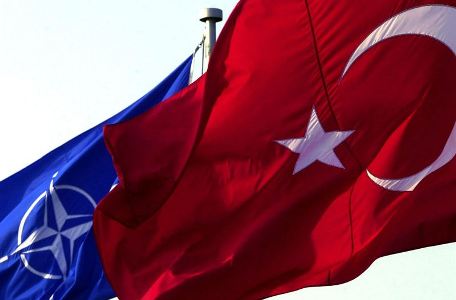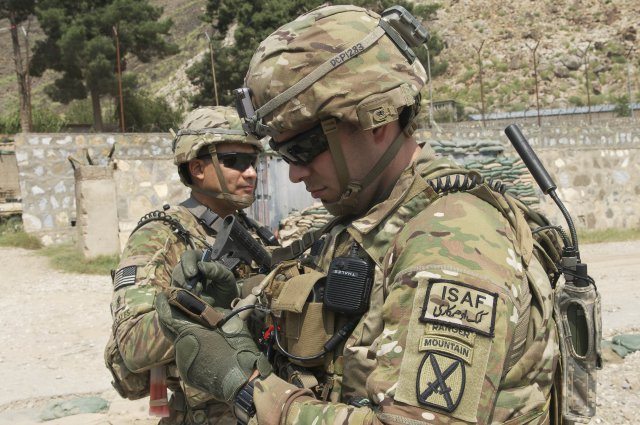Turkish Prime Minister Ahmet Davutoglu announced five defense projects on Wednesday, following a Defense Industry Executive Committee meeting in Ankara.
Davutoglu said that Turkey would order four more fifth generation stealth F-35s, which will be the new front line fighters of the Turkish Air Force.
“We will have four more next generation F-35 fighters, of which two have already been ordered, and Turkey is planning to acquire 100 F-35 fighters through 2030. The Turkish air force will be modernized with the most advanced new generation aircraft, the Lockheed F-35.”
Turkey had already placed an order for the first two F-35 jets for the projected fleet of 100 F-35A aircraft on May 5 of last year, and plans to deploy the aircraft by 2019.
The F-35s will replace the ageing fleet of F-4 and F-16 aircraft. On Dec.12 of last year, the Pentagon said that Italy and Turkey would provide initial heavy maintenance of the F-35 fighter jet and its engine in Europe from 2018.
The modern F35 fighter is being developed and built by the U.S defense contractor Lockheed Martin for the U.S., Britain, Australia, Italy, Norway, Turkey, the Netherlands, Denmark and Canada in a project worth about $400 billion, making it the world’s most expensive weapons program.
Davutoglu also said the Committee made the decision at the meeting to continue talks on Turkey’s planned long-range missile system project with all tenders.
The Turkish Long-Range Missile Defense System Project is one of the biggest projects of the defense industry, and Chinese, American and Italian-French companies are seeking to participate in it. Negotiations are currently in the hands of Defense Industry Undersecretariat, Davutoglu said.
Last August, the Defense Industry Under secretariat announced the project called T-LORAMIDS, for the country’s air and missile defense program. This has been continued, as of Dec. 31 of last year, by the ministry to negotiate further with a number of companies.
Work is to start on the preliminary design stage for Turkey’s next generation air-to-air combat fighter, which is called TFX, a fifth-generation jet fighter.
Turkey’s Defense Industry Executive Committee in 2010 started the TFX project to replace Turkey’s F-16, and to design, develop, and manufacture a fleet that would work together with the Stealth F-35.
“This national fighting aircraft development project is Turkey making its own combat aircraft. We had previously agreed to the principles for the project. Now it has been decided to move to the preliminary design stage and the latest pre-design phase will be completed in 4 years,” Davutoglu said.
“Our goal is to build the first TFX prototype aircraft in 2023, and we will prepare the way for this project. Today, we have launched the preliminary design stage.”
The country, which has been a partner in the U.S. Joint Strike Fighter program from the concept development phase, has contributed to system development and demonstration and production and follow-on development phases.
Davutoglu said that the government has decided to start mass production of the modern infantry rifle MPT 76 for the Turkish Land Forces.
“We are planning to produce 35 thousand rifles in the first stage. We assessed the necessary requirements for this, and we decided on serial production.”
The 7.62 mm chambered rifle is intended to become the new standard infantry weapon for the Turkish Armed Forces.
Davutoglu also said that Turkey will buy five additional Boeing CH-47F Chinook twin-engine, tandem rotor heavy-lift helicopters.
Turkey, a NATO member state since 1952, said in September of last year that it had chosen the FD-2000 missile defense system from China Precision Machinery Import and Export Corp for a $3.4 billion project with high technology transfer-over systems from the Italian-French and American companies.
Turkey was facing unprecedented pressure from NATO and the U.S. to back away from the deal with state-run Chinese firm CPMIEC, because the Chinese system is incompatible with NATO systems.
Communication technology of the highest level will be used for the Turkish Armed Forces, Davutoglu said.
“The defense industry is one of the most important sectors for the protection of the independence, freedom and the survival of a country,” he added.
The Turkish Defense Industry High Coordination Council will gather in April to discuss the development of these projects.











